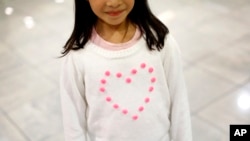A federal judge this week dismissed most of a lawsuit against the Trump administration over its cancellation last year of a program that reunited children from Northern Triangle countries in Central America with their immigrant parents in the United States.
In a ruling handed down Monday, Magistrate Judge Laurel Beeler determined that the federal government had largely justified its decision to end the short-lived Central American Minors (CAM) parole policy abruptly in August 2017.
One part of the suit, however, will move forward, and its outcome could affect thousands of children who were preparing to be reunited with their parents before the U.S. government rescinded its policy.
In a year of massive changes to the U.S. immigration system, the U.S. Department of Homeland Security (DHS) quietly ended the CAM Parole program last year. Since 2014 — the year that young migrants and families trying to enter the U.S. illegally through the southern border reached a national-attention-grabbing level — more than 13,000 people had applied through the program, according to federal court documents. About 3,000 were able to settle in the U.S. because of the CAM program.
But when DHS shuttered the program, 2,700 beneficiaries (children and other qualifying family members in three countries — Honduras, Guatemala and El Salvador) had received "conditional approval" but had not yet traveled to the U.S. because they were waiting on medical exams, final security checks or travel arrangements. They had every expectation of being reunited with their parents, who were required to be lawfully present in the United States in order to qualify for the program.
"The Trump administration has pulled the rug out from under vulnerable children and their parents who spent years and thousands of dollars complying with every step of the government's CAM application process," Linda Evarts, an attorney with the International Refugee Assistance Project, the group representing the plaintiffs in the case, said after the judge's decision was released Monday. "Today's ruling is an important first step to providing needed relief to children and parents seeking to reunite with each other in safety."
Government lawyers argued that the CAM program was not in line with the Trump administration's desired immigration policies and DHS's intent in "pursuing a new strategy to secure the U.S. southern border." In turn, the judge said it was not her place to override the agency's decision in that sense, according to the ruling.
But she also said the mass recission of parole from those children who had already been conditionally approved to travel to the U.S. violated the Administrative Procedure Act.
The plaintiffs must now wait on the judge to rule on their request for a preliminary injunction, which seeks to have the mass recission vacated and give those 2,700 beneficiaries left in limbo a path toward reunification.




